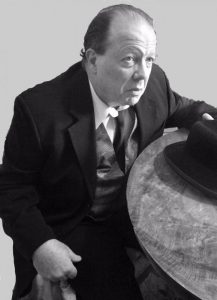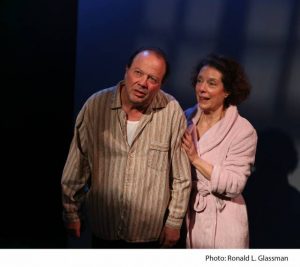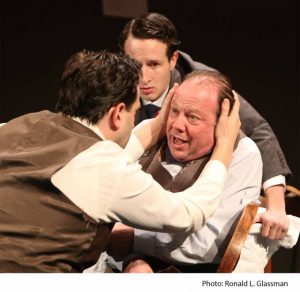
 At age 10 Avi Hoffman (born Avrum Ber, in 1958) made his theatrical debut in a Yiddish Folksbiene Theater production called Bronx Express. In the decades that followed, the performer, a son of Holocaust survivors, has appeared in a wide range of theatrical endeavors, both in New York City and regionally. He’s played in Shakespeare’s The Tempest and in such American musicals as Dear World and Closer Than Ever. Hoffman is perhaps best known as the star of a trio of one-man shows that celebrated his cultural heritage: Too Jewish? (1995), Too Jewish Two! (1998), and Avi Hoffman’s Still Jewish After All These Years: A Meshugene Life in the Theater (2013).
At age 10 Avi Hoffman (born Avrum Ber, in 1958) made his theatrical debut in a Yiddish Folksbiene Theater production called Bronx Express. In the decades that followed, the performer, a son of Holocaust survivors, has appeared in a wide range of theatrical endeavors, both in New York City and regionally. He’s played in Shakespeare’s The Tempest and in such American musicals as Dear World and Closer Than Ever. Hoffman is perhaps best known as the star of a trio of one-man shows that celebrated his cultural heritage: Too Jewish? (1995), Too Jewish Two! (1998), and Avi Hoffman’s Still Jewish After All These Years: A Meshugene Life in the Theater (2013).
This fall, Hoffman is taking on one of the most famous and challenging roles of the American stage: Willy Loman, the protagonist of Arthur Miller’s 1949 middle-class tragedy, Death of a Salesman. Since its original Broadway staging, the part of the aging, mentally deteriorating on-the-road merchant has been played by a parade of acclaimed performers. Lee J. Cobb originated the role in the first production (directed by Elia Kazan). Among those who followed in Cobb’s shuffling footsteps were Fredric March, George C. Scott, Rod Steiger, Brian Dennehy, and two actors with a surname matching that of the former Avrum Ber: Dustin Hoffman and Philip Seymour Hoffman.
The latest Hoffman to play Willy says that, in some ways, taking on such an iconic American role has been a “very daunting, very humbling” task.
“On the other hand,” he adds, “I have a great advantage here in that I’m not doing it the way they’ve done it. I’m doing it in Yiddish, which adds an enormous dimension to both the universality of the piece but also to the specificity of the piece.”
The new Salesman is the most recent effort by Manhattan’s New Yiddish Rep to reimagine the world’s theatre classics by performing them in the ancient Jewish language (supplemented with English supertitles). In 2013, the company produced a Yiddish-language rendition of Samuel Beckett’s Waiting for Godot—a production directed by Moshe Yassur, who also helms Salesman. (Hoffman played the supporting role of Pozzo in Godot.)
Despite popular and scholarly speculation to the contrary, Arthur Miller—himself famously Jewish—long insisted that Willy and the other Lomans were not intended to be of Jewish heritage. However, the title character was inspired in part by an uncle of Miller’s named Manny Newman. (Like Willy, Manny brimmed with unconvincing bravado—and, like him, he wound up committing suicide.)
It’s worth noting that, when it came to casting the first actor to play Willy, the Jewish Cobb (born Leo Jacob) was chosen. In Miller’s 1987 memoir, Timebends, he described Cobb as “an actor I remembered mainly as a mountainous hulk covered with a towel in a Turkish bath in an Irwin Shaw play, with the hilarious oy vey delivery of a forever persecuted businessman.” Clearly the playwright wasn’t insistent on having an actor with a thoroughly gentile-seeming identity as his salesman.
 And while he long encouraged the portrayal of the Lomans as lower-middle-class all-Americans, Miller did allow a Yiddish adaptation of the play (Toyt fun a seylsman) by Joseph Buloff and Luba Kadison (who also starred, respectively, as Willy and his wife Linda), to be performed both in Argentina and in Brooklyn in 1951. In fact, it’s the Buloff/Kadison script (with some notable tweaks) that is being used for the New Yiddish Rep production.
And while he long encouraged the portrayal of the Lomans as lower-middle-class all-Americans, Miller did allow a Yiddish adaptation of the play (Toyt fun a seylsman) by Joseph Buloff and Luba Kadison (who also starred, respectively, as Willy and his wife Linda), to be performed both in Argentina and in Brooklyn in 1951. In fact, it’s the Buloff/Kadison script (with some notable tweaks) that is being used for the New Yiddish Rep production.
Hoffman finds it understandable that Miller would not in 1949 have encouraged the depiction of the Lomans as explicitly Jewish. He points out that the play was produced at a time when Jewish identity worldwide was in flux. The play was produced on Broadway only a year after the state of Israel was formed—“when suddenly the Jewish psyche went toward this ‘new Jew,’ the ‘Hebrew Jew,’ the ‘strong Jew.’” This emerging trend was in marked contrast with the tendency in America toward blending in. “Assimilation was the going structure of Jewish society at that time,” Hoffman says. “So, in 1949, Arthur Miller and Elia Kazan could not come out with a show about Jews. It would have been a horrible failure, I think.”
In his preparation for the New Yiddish Rep staging, Hoffman created a specific backstory for his character:
“I believe that Willy Loman immigrated to the United States in the second wave of immigration in 1915. He had to learn English as a second language. He struggled to survive, like all of the immigrants of the time, probably on the Lower East Side. He became a peddler, had a modicum of success, and became a traveling salesman.”
Viewing the Lomans as immigrants helps make the play timely, according to Hoffman: “America is an immigrant culture. Today, in 2015, you turn on the news, and all they’re talking about is immigrants and refugees.” He says he would be interested in seeing the play produced with the Lomans as Irish or Italian immigrants.
One of the changes that director Yassur and company have made to the Buloff/Kadison script is to play a few of the play’s scenes in English. This helps to show the struggles of nonnative speakers in mainstream American culture. Scenes set in Boston featuring the woman with whom Willy is having an affair and in the restaurant where Willy and sons Biff and Happy interact with two “chippies” show immigrants and nonimmigrants mingling and trying to communicate. “For me,” says Hoffman, “the challenge as an actor is, well, how good is Willy Loman’s English?”
 Scholars have pointed out that the playwright’s English-language dialogue often mirrors the linguistic structure of Yiddish. Instead of saying “People need to pay attention,“ Linda Loman speaks the play’s most famous line as “Attention must be paid…” (seemingly mimicking the Yiddish syntax: “Men darf akhting geybn…”). Likewise, Hoffman notes that when the woman in Boston asks Willy when he’ll be coming back to the city, he answers not “Oh, in about two weeks” but rather “Oh, two weeks about.”
Scholars have pointed out that the playwright’s English-language dialogue often mirrors the linguistic structure of Yiddish. Instead of saying “People need to pay attention,“ Linda Loman speaks the play’s most famous line as “Attention must be paid…” (seemingly mimicking the Yiddish syntax: “Men darf akhting geybn…”). Likewise, Hoffman notes that when the woman in Boston asks Willy when he’ll be coming back to the city, he answers not “Oh, in about two weeks” but rather “Oh, two weeks about.”
Yiddish has often been associated with stage comedy. Hoffman agrees that while Salesman is essentially tragic, there are comedic elements in the play, especially in the fractious yet loving relationship between Willy and his neighbor, Charley. But he believes there is much more than mere jokiness in the language, and that the richness of the words comes across bountifully in the Buloff/Kadison adaptation: “There is no shtick in this piece…” Hoffman says. “No, Yiddish is a very rich language that has humor and a lot of pathos… a lot of very serious expression. And that’s what I think we’re trying to bring.”
Although he will undoubtedly continue to perform in a variety of plays and musicals, Hoffman has a special commitment to Yiddish-language productions such as this one. Pointing out that Yiddish was his first language, he confides that he finds the Yiddish stage, however shrunken it may be in 2015, to be imbued with a sense of purpose that other theatrical endeavors seem to lack. “It’s a real mission to save and ensure the survival of a thousand-year-old language and culture,” he says.
Death of Saleman plays at the Castillo Theater through November 22.